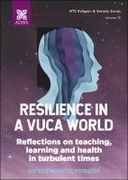Explore

Resilience in a VUCA world
0 Ungluers have
Faved this Work
Login to Fave
This book sheds light on how humans deal with adversity, especially in uncertain and turbulent times, as seen during the COVID-19 pandemic. Resilience theory has become popular in scholarly discourse, and the term is difficult to define as so many opinions exist. This book aims to engage critically with resilience theory as a scholarly debate from the unique vantage point of the world of social work as well as theology. This specific aspect of originality contributes to the generation of new knowledge in the broad field of social sciences and humanities. The inception of the book stems from an interdisciplinary conference held at Hugenote Kollege, Wellington, where scholars from social work as well as theology engaged in a discourse on resilience. Professor Adrian van Breda, a specialist in resilience theory and from the social work department of the University of Johannesburg, was one of the keynote speakers, inspiring scholars to understand what is meant by resilience. Professor Yolanda Dreyer from the University of Pretoria and a seasoned theologian and prolific writer on trauma and resilience, was also a keynote speaker, providing insights from a theological perspective. The collaboration between these two fields of thought is unique and rendered new insights into engaging with resilience. Different methodologies and perspectives from researchers are prevalent as contributors are from different scholarly fields. The book ranges from linguistical, liturgical, philosophical, practical, autoethnographical, anthropological, sociological, and online methodological approaches contributing to ways to deal with traumatic, turbulent and trying times. The book is divided into four main themes that stood out from the results obtained at the conference, namely, (1) religious imagination and resilience, (2) communities and resilience, (3) online teaching and resilience, and (4) the resilience of philosophical questions.
This book is included in DOAB.
Why read this book? Have your say.
You must be logged in to comment.
